Travel Tips: RVing and Firearms
Travel Tips: RVing and Firearms
You carry a fire extinguisher to stop a fire; so consider a hand gun to stop an invasion.
By Jeannette and Dan Dudek
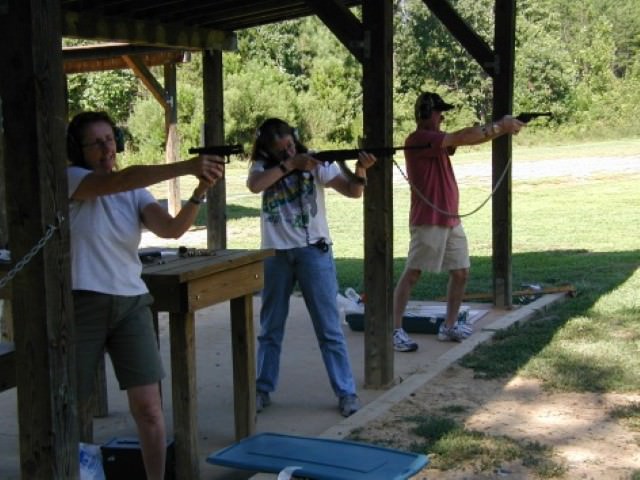
Jeannette and Friends at Outdoor Firing Range
In the U.S. there is much confusion about individuals carrying firearms. If you plan on traveling in North America in a Recreational Vehicle (RV), you should understand not only the advantages of carrying a firearm in your RV, but under what circumstances law enforcement officers would recommend you do so. This article explains the advantages and how you can get started in obtaining a handgun.
First, understand that most RVers do have a firearm in their vehicle, and there is a reason for this. When you are in an RV, you will sometimes have to boondoggle, i.e. stay overnight in a non-campground location. Why? The most common reason is that you planned on doing so to save some money and/or time, i.e. if you are just stopping for the night, a boondoggle can be the easiest and fastest way to travel. Another reason is that you cannot camp in the place you intended. Maybe you got a late start, or there were traffic delays, etc. and you cannot safely drive the distance to reach your intended campground; or you arrive at your campground only to find that it closed temporarily for some reason.
Some locations for a boondoggle are safer than others. For example, certain establishments are “RV Friendly”, such as Wal-Mart, Flying Jay, Cracker Barrel Restaurants, etc. All you have to do is ask the manager if it is okay to park overnight; and if so, where in the lot does he/she prefer you park. It is also desirable if you use the establishment to purchase supplies, food, gas, etc.
You can often boondoggle in the parking lot of a church or office building, or the side of the road, or at a U.S. Core of Engineers location. Even if not boondoggling, i.e., you may even be in a defined campground in the off-season that is, for all practical purposes, deserted — and many times these locations are without cell phone reception.
In any case, some of these areas can turn out to be “uncomfortable” from a security stand point, but it is often too late and you are too tired, or too far “in the boon docks” to drive to another location. Having a gun in your RV will be very reassuring in these situations. If someone does try to break into your RV, just shouting “We have a gun!” will many times scare off the person or persons. If not, when a door or window is forcibly opened, you can get off one or two rounds that will possibly save your life, and the lives of those with you.
A DEA (Drug Enforcement Administration) agent friend of mine stated that he would not even consider RVing anywhere in the southwest U.S. without a handgun. He went on to state that “snow birds” in RVs are often targeted by criminal elements because they typically travel with cash and items easy to pawn.
Let me explain that I was not a “gun” person. I grew up in the northeast U.S. and did not know anyone who owned a gun. Eventually I moved to North Carolina and became active in RVing. After two scary experiences while camping in my RV, I decided to investigate getting a handgun for protection. Fortunately, one of my friends was a handgun instructor, and she offered to help me. I was very intimidated when I first held a gun and did some shooting. After awhile, I got the hang of shooting and decided to purchase a handgun for the RV and personal protection.
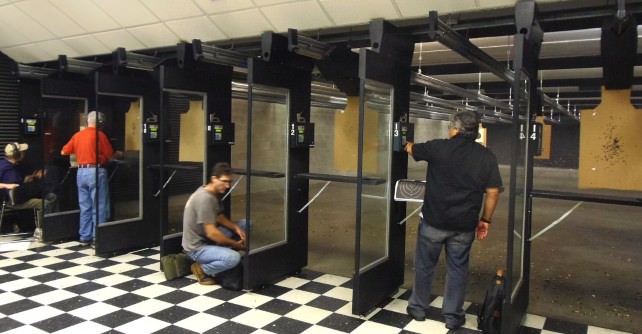
Point Blank Firing Range
Photo: Getting a few basic lessons from a certified instructor using a modern firing range allows you to become comfortable with a hand gun and learn not only how to shoot, but to handle the gun in a safe manner.
After obtaining the handgun, I obtained lessons from my certified hand gun instructor friend. During the course of these lessons, she suggested I obtain a permit for Concealed Handgun Carry. She explained that North Carolina was a “shall issue” state, i.e. if you requested a concealed permit, the state has to approve it unless there is a reason for not doing so. You do have to get a background check from your local county’s sheriff’s office, get fingerprinted, take a course, pass a proficiency test and pay a fee. This is all to your advantage. The police officers in all the states understand that if you go through the process of obtaining a Concealed Carry Permit, you are one of the “good guys”; and they supposedly give you some extra leeway when it comes to state laws. Do not forget, you are responsible for knowing the various laws of the countries and the local government districts (provinces, states, cities, etc.) in which you will be traveling.
(Note: The book, Traveler’s Guide to the Firearm Laws of the Fifty States, by J. Scott Kappas, Esq. is an excellent source for information on this topic.)
So let me give you a quick summary of the advantages of having a legal hand gun while traveling in an RV or camper. First, it gives you an extra layer of protection against thieves and criminal elements of our society if they decide to target your RV. Second, it reduces your stress when you are forced to make camp in a location that has some safety concerns. Third, when legally permitted to do so, it provides personal protection to you and your companions when hiking or biking on trails around your campsite. Fourth, it gives you the ability to combine the recreational activities of camping and target shooting.
So, how do you get started? I recommend going to a reputable gun firing range and ask to get some basic instructions; and while doing so, try a few different types of hand guns. You will want one that you are comfortable handling and shooting. The most recommended type of gun for beginners is a revolver, such as a 38 Special. It is easy to use and is reliable to shoot. Personally, I prefer a semi-automatic such as the Glock 19. Your gun store representatives will most likely state that for personal protection you should consider at least a .38 caliber or 9 mm handgun, i.e. one with “stopping power”. However, if you are more comfortable with a smaller gun, for example, a .22 caliber, then that is what you should get. Glock makes great 9 mm’s, Smith & Wesson has good .38 SPs and Ruger has a very nice 22; and these guns are very affordable. The key is to find a gun you like; so try/rent a few and experiment. If you purchase a good quality hand gun from a well-known manufacturer, you will be well satisfied.
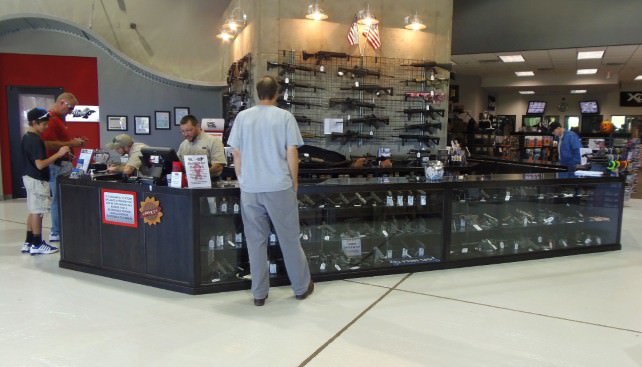
Point Blank Gun Counter – selection of firearms for sale at a typical firing range’s store
Note: When purchasing a hand gun, the sales person may suggest you get a “trigger job” performed on your gun, especially if you mention you might be using the gun in competition. This is NOT recommended for those starting out; and for anyone who will be using the gun for protection. A “trigger job” will usually reduce the pressure it takes to pull the trigger, and makes the trigger smoother and easier to pull. The major disadvantage is that in an adrenalin-fed, life-threatening situation, you do not want a light finger pull to prematurely fire your gun. In the future, if you truly use a gun solely for competition, then you can consider getting a “trigger job”.
Once you have purchased your hand gun, you should get some additional lessons and practice. Please make the effort to get to a range to fire your hand gun at least a few times a year. Then at least once a year clean your hand gun as recommended. If you do a search on YouTube.com, you can quickly find several videos that will guide you step-by-step through the disassembly and cleaning process for your make and model gun.
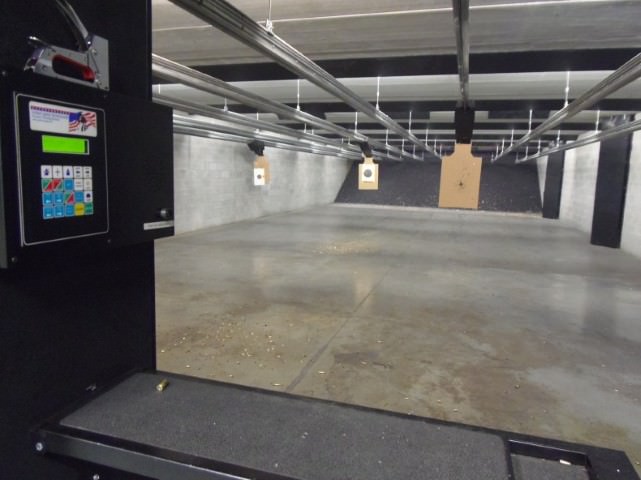
Shooting Range at Point Blank
Photo: Today’s modern ranges with state of the art equipment make target practice a pleasure. Some of the ranges, such as the one pictured above at the Point Blank Range, can have the targets programed to simulate various firing scenarios.
You will need ammunition, and probably at least two different types. To keep it simple, any ammunition from a well known brand such as Wilson, Remington, CCI, Winchester, American Eagle, PMC, Federal, etc., will do just fine for target practice. Just stay away from “reloads” and brands from the Far East. (Always purchase just one box and test the ammunition in your gun before making any bulk purchases of the same ammunition.)
For ammunition that you will load in your magazines for defense, hollow-point bullets are recommended. The hollow-points are safer than other types of bullets since they expand when they hit an object. This greatly reduces the chance that a bullet will travel through a person, wall, fence, etc. and hit some innocent person. The hollow-points are a bit more expensive, so you do not normally use them for target shooting. However, do be sure to “test” your hollow-points in your gun by firing a few rounds at a shooting range.
If you have an RV or camper, I also strongly recommend you invest in TWO gun safes. One that you permanently mount somewhere in the back of your RV; and then mount the other safe in a location close to your bed in your home. Do not try to use one safe and move it as it is too much trouble. Once you have your safes, do keep your gun in one ready to use for your protection. Personally, I have two magazines fully loaded with hollow-point bullets in my safe next to my 9 mm Glock. I purposely keep the magazines out of the gun as I feel the extra few seconds it will take to load the magazine and chamber a round, will be useful to ensure I am fully awake to use the gun appropriately.
If your state is a “shall issue” state, go ahead and obtain your Concealed Handgun Carry Permit. It will insure you know the law regarding guns in your state. Another advantage of obtaining a Concealed Handgun Carry Permit is that it allows you to legally carry your hand gun (in many states) when on a trail hiking or mountain biking. You are always encouraged to avoid any situation that you feel is “not right”, however you should also be aware that in the U.S. most assaults on hikers and bikers occur within 100 yards of a parking area. Criminals who prey on hikers and bikers want to be able to get to their cars quickly to make their escape.
Note: You should also be aware that UNCONCEALED carrying of hand guns is not regulated in most U.S. states. In many states, you can legally carry a hand gun on your person or vehicle as long as it visible to the typical observer. There are issues with unconcealed carry, including: someone may try to take the gun from you; you might drop it if you do not have a quality holster; and someone unfamiliar with the state laws may call the police and state in a panic that you are carrying a gun and threatening people. The last situation is not uncommon; it usually results in the police arriving and handcuffing you until they sort things out and release you. This is why most people who desire to carry a hand gun get a Concealed Carry permit.
If you are still a bit intimidated about using your handgun, consider participating in any of the numerous competitive shooting matches that are available. Participating in matches quickly allows you to overcome any intimidation, increase your effectiveness, and give you a general sense of control of your fire arm.
For the most part, you do not have to join any organization to compete. There are some exceptions, such as the Glock Sport Shooting Foundation (GSSF). You need a Glock hand gun and must be a registered member of GSSF to participate in their matches; but these are excellent matches to get started in competitive shooting. Your shooting range can help you find matches in your area, and they might even sponsor some matches themselves. (My wife and I participated in the Ruger 22 matches at our local shooting range. All you need is any .22 caliber pistol and .22 caliber rifle. These matches are a lot of fun and can be a family event.)
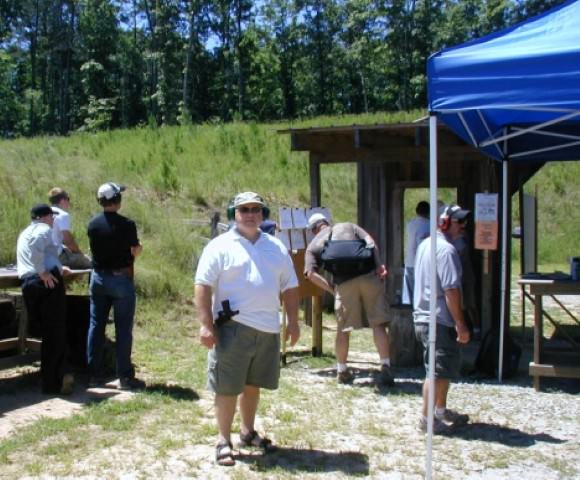
Dan Participating in his First Hand Gun Competition, a GSSF Match in Georgia
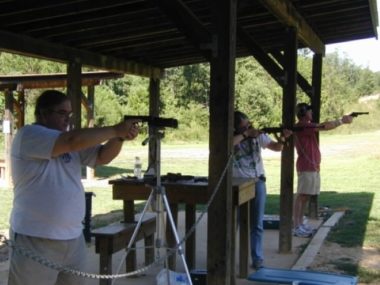
Dan Shooting With a Handgun
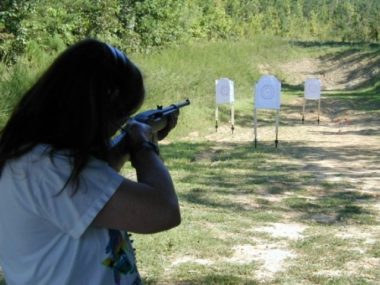
Jeannette Shooting her Ruger 22 Rifle
Another way to get practice with your hand guns, rifles and shot guns is to combine shooting with camping. Many states provide free or just charge a nominal fee for using outdoor state ranges. Many of them are maintained and operated by the state’s Wildlife Resource Commissions. You can go on-line and find a list of such ranges in your area, or the places you will be visiting.
There are also excellent private ranges open to the public that are located near camping areas or attractions where camping is permitted. For example, if you are in the Charlotte, North Carolina area, and camping at the Lake Norman State Park, one of the area’s many private campgrounds, the Charlotte Motor Speedway (during a NASCAR event) or Paramount’s Carowinds theme park — you could stop in and shoot at the Point Blank Range located just off of I-77 at Exit 36.
Point Blank Range has been designated as a Five Star Range by the National Shooting Sports foundation. A range must demonstrate excellence in all aspects of management and operations to receive this NSSF designation. Ranges are rated on appearance, management, customer service, amenities, customer development and community relations. There are only 25 indoor and outdoor ranges in the entire US that have received this designation; to get the list of the other ranges click here.
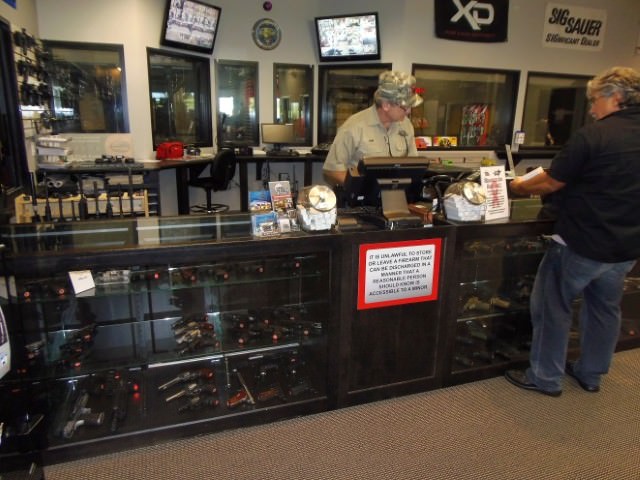
Renting at Point Blank Range
Photo: Most firing ranges, such as the Point Blank range (above), will rent you everything you need for getting started, i.e. handguns to try, hearing and eye protection; and sell you targets and ammunition.
In my opinion, having a legal handgun in an RV (or one at home) is just like having a First Aid Kit. I hope I never have to use either, but I want to be prepared in case I need to save my life, the life of a family member or a companion.
A few additional comments about traveling with a Firearm are presented below for your consideration.
Traveling with a Firearm
- Many RVers travel with a firearm, if you do, be sure to know and observe the local and state laws that apply for the states you will be traveling
- Some states restrict the capacity of magazines
- Some states only allow you to transport a handgun if you are making continuous and uninterrupted travel through the state
- Recommend obtaining a Concealed Carry Handgun Permit if you travel to a number of different states as this gives you a bit more leeway under some state laws and with law enforcement officers
- Recommend you purchase and read the book “Traveler’s Guide to the Firearm Laws of the Fifty States” by J. Scott Kappas, Esq.
- Recommend a gun safe be installed in the back area of your RV; it should be in a place that is not readily accessible to the driver or any passenger
- Be careful about how you respond to an officer’s questions if you are stopped for any reason; research how to legally respond to questions about firearms and volunteering your vehicle to be searched (laws vary from state to state)
- Canada limits magazines to a ten round capacity and requires a permit to bring a firearm into the country
- Public ranges provide good opportunity to safely practice for very little cost and many Wildlife Areas have ranges near camping areas
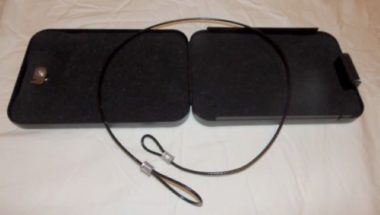
Handgun Case
Note: U.S. law allows its citizens the privilege of transporting firearms across state lines. This includes transporting firearms by road or airplane. There are specific regulations that must be followed; and these regulations can be obtained from each state and each airline carrier. However, for the most part, handguns can be transported in checked airline baggage. They have to be declared, and stored in a locked hard case (such as the one to the right). There are specifically designed cases for this purpose. In addition to being suitable for transporting by air, these cases usually come with a security wire that can be attached to a fixed object. Therefore these cases can be used in the trunk of a car, and secured to the trunk’s metal hinge bars. Check with the carriers and authorities for details.
Read More in Jeannette and Dan Dudek’s Travel Tips Safety Series:
Travel Tips: Travel Safe and Smart
Part 1 — Things to Consider Before You Take a Trip
Part 2 — Traveling by Airplane
Part 3 — Hotel Safety
Part 4 — Security & General Suggestions for International Travelers
Bio:
Jeannette and Dan have traveled extensively domestically and internationally; and have been to most U.S. states and Canadian provinces and about 30 countries.
Besides international travel, Jeannette and Dan enjoy traveling North America in their RV, as well as handgun competitions, sailing, hunting, hiking, mountain biking and other outdoor sports.
In addition, Dan is a member of the NRA and the IDPA (International Defensive Pistol Association); and both Jeannette and Dan are active in handgun shooting competitions.


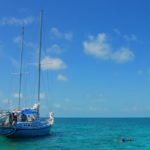
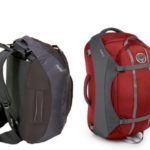

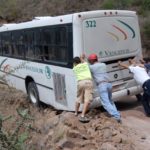




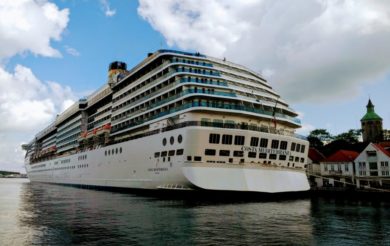

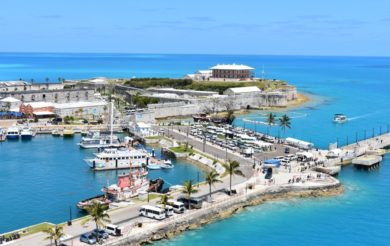

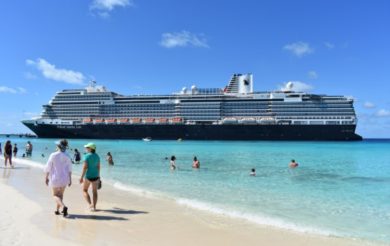






2 Responses to Travel Tips: RVing and Firearms